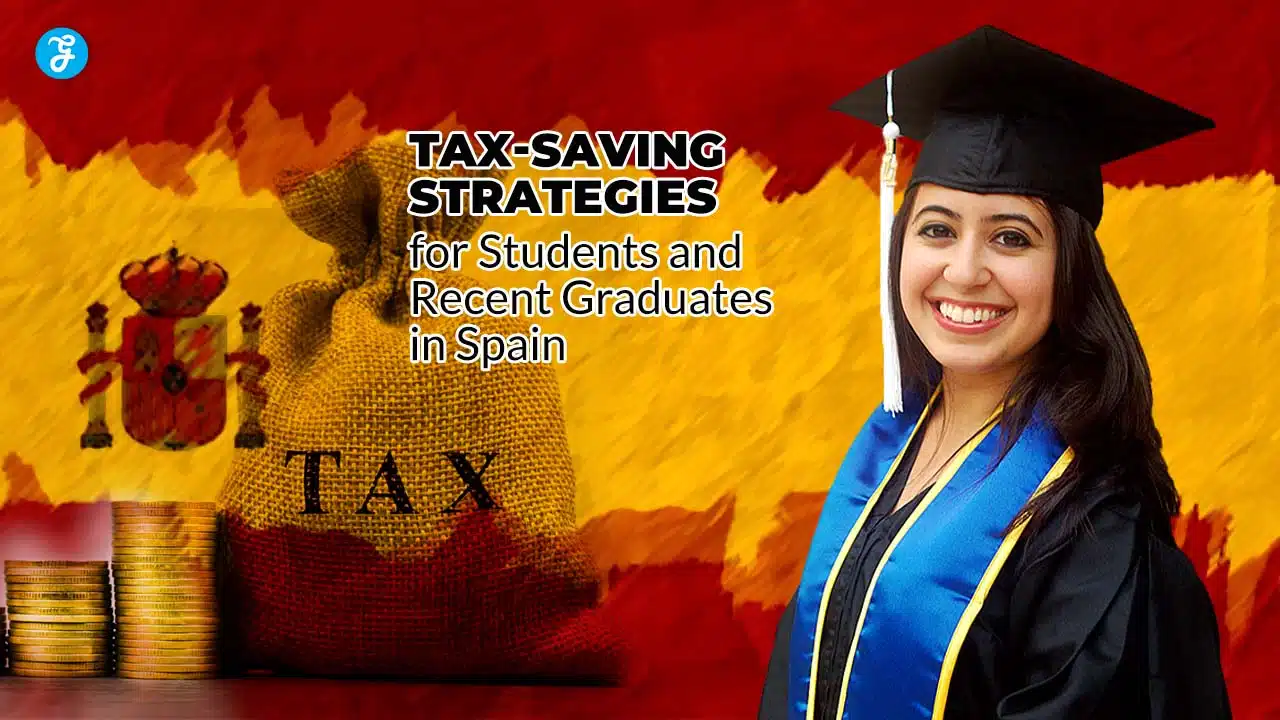Navigating the complexities of the Spanish tax system can be a daunting task for students and recent graduates. Whether you’re studying, just starting your career, or living abroad, understanding how to minimize your tax liability can provide you with significant savings.
In Spain, there are several tax-saving strategies available to students and recent graduates that can help reduce the amount of tax you owe.
This guide will walk you through the 15 most effective tax-saving strategies, so you can keep more money in your pocket.
1. Understand Spain’s Tax Residency Rules
Why It’s Important:
In Spain, your tax residency status determines whether you will be taxed on worldwide income or just your Spanish-sourced income. If you spend more than 183 days a year in Spain, you are considered a tax resident and are required to pay taxes on all your income, regardless of where it’s earned. Non-residents, on the other hand, are only taxed on income sourced from Spain.
How It Saves You Money:
If you are a non-resident, you may save on taxes, as you won’t be taxed on your global income. Being aware of your residency status can help you avoid overpaying taxes.
Tip: If you’re unsure about your tax residency status, consult a tax advisor who can help clarify your situation based on your duration of stay in Spain.
2. Utilize Education-Related Tax Deductions
Eligibility:
Spain offers various education-related tax deductions that students can benefit from. For example, tuition fees and school supplies may be deductible in some autonomous regions, including Madrid, Catalonia, and Valencia. Some regions also allow deductions for books, study materials, and even some extracurricular activities.
How It Saves You Money:
Claiming these education-related deductions can reduce your taxable income, ultimately lowering the amount you owe to the Spanish tax authorities.
Tip: Keep detailed records of all your education-related expenses, such as receipts for tuition payments, textbooks, and study materials, to ensure you claim the maximum deductions available.
3. Claim Rent Deductions for Students
Eligibility:
Students living in rented accommodation in Spain may be eligible for tax deductions on their rent. Some regions offer deductions of up to 15% of rent payments, though the specific amount can vary depending on the region.
How It Saves You Money:
Rent deductions can significantly lower your taxable income, reducing the overall tax burden. If you qualify, these deductions could save you hundreds of euros per year.
Tip: Check with your local tax office or consult a tax professional to determine the exact rent deductions available in your autonomous community. Ensure your rental agreement is formalized to meet the legal requirements for claiming the deduction.
4. Leverage Scholarships and Grants
Why It’s Important:
Many scholarships and grants, both national and international, are tax-exempt in Spain, provided they meet the criteria set by the Spanish tax authorities. These grants are typically intended to support students in their education, and they don’t count as taxable income.
How It Saves You Money:
If you receive a scholarship or grant, you don’t have to report it as income, which reduces your taxable income and ultimately saves you from paying unnecessary taxes.
Tip: Review the terms and conditions of your scholarship to ensure it qualifies as tax-exempt. If you are unsure, consult with a tax professional to confirm your eligibility.
5. Deduct Expenses for Professional Training and Certifications
Eligibility:
If you’re a recent graduate, expenses related to professional training, certifications, and skills development courses can often be deducted from your taxable income. These expenses must be directly related to your current or future career and be necessary for professional development.
How It Saves You Money:
By deducting the costs of your career-enhancing courses and certifications, you can lower your overall taxable income and reduce the amount of tax you owe.
Tip: Keep receipts for all courses, training programs, and certifications you undertake. If you are self-employed or freelancing, make sure these expenses are categorized as business expenses on your tax return.
6. Take Advantage of Tax-Free Internships
Why It’s Important:
In Spain, some internships, particularly those linked to university studies, are tax-exempt. This means the stipend or salary you earn during the internship may not be subject to income tax. However, the internship must meet specific conditions, such as being part of an educational program.
How It Saves You Money:
If you qualify for tax-exempt internship status, you’ll save money by not having to pay income tax on your internship earnings.
Tip: Make sure your internship is officially registered as part of your university program and check with your employer to confirm if your stipend is exempt from taxes.
7. Open a Tax-Free Savings Account (Cuenta Ahorro Joven)
What It Is:
A “Cuenta Ahorro Joven” is a savings account designed specifically for young people under 30. The Spanish government offers tax benefits for individuals who open this type of savings account, including tax exemptions on the interest earned.
How It Saves You Money:
The interest earned in this type of account is often tax-free, helping you save more money over time. Additionally, this savings account can be used for specific goals like purchasing a home or funding education.
Tip: Take advantage of the benefits provided by this account if you’re under 30. It’s a great way to build up savings while reducing your tax liability.
8. Claim Tax Deductions for Moving Expenses
Eligibility:
If you’ve recently relocated to Spain for educational or work purposes, you may qualify for deductions on moving expenses. This can include the cost of transporting personal belongings, hiring moving companies, and even travel expenses associated with your move.
How It Saves You Money:
These deductions reduce your taxable income by offsetting the costs incurred during your move.
Tip: Save all receipts for transportation and moving services, and make sure to claim them on your annual tax return. The exact deductions available vary by region.
9. Maximize Deductions for Public Transport Passes
Why It’s Important:
Public transportation expenses can be deducted in certain regions of Spain. The “Abono Joven” pass, for example, allows young people in Madrid to access discounted rates for metro, bus, and other forms of public transport. Some regions offer tax relief for these expenses.
How It Saves You Money:
By deducting transportation costs, you can lower your taxable income and save money.
Tip: If you regularly use public transport for commuting to school or work, apply for a discount pass and keep records of all transport-related expenses for tax filing.
10. Understand Spain’s Dual Tax Treaties
Why It’s Important:
For students or recent graduates from outside Spain, Spain has dual tax treaties with several countries. These treaties ensure you are not double-taxed on income earned in both Spain and your home country. If you’ve paid taxes in your home country, you may be entitled to a tax credit in Spain.
How It Saves You Money:
By benefiting from the dual tax treaty, you can avoid being taxed on the same income twice, saving you from a substantial tax burden.
Tip: If you are a foreign student or graduate, check if your country has a tax treaty with Spain and ensure you file the necessary forms to claim your benefits.
11. Explore Regional Tax Benefits
What It Means:
Autonomous regions in Spain have the authority to implement their own tax rules and deductions. For example, the region of Andalusia provides tax breaks for young people purchasing their first home, while the Canary Islands offers tax deductions for education expenses.
How It Saves You Money:
Regional tax benefits vary, so exploring what’s available in your area can provide substantial savings.
Tip: Research your region’s specific tax benefits or consult with a local tax advisor to learn about any available deductions or credits that could apply to you.
12. Work as a Freelancer and Deduct Expenses
Why It’s Useful:
Freelancers, or autónomos, in Spain can deduct a wide range of business-related expenses, such as internet costs, office supplies, work-related travel, and professional memberships. This is especially helpful for recent graduates starting their own businesses or freelance careers.
How It Saves You Money:
By deducting your business expenses, you reduce your taxable income and ultimately your tax liability.
Tip: Keep detailed records of all your business-related expenses, and ensure that they are legitimate and necessary for your work.
13. Take Advantage of the Digital Nomad Visa Tax Benefits
What It Is:
The Digital Nomad Visa, introduced in 2023, allows remote workers to live and work in Spain while benefiting from a flat 15% income tax rate for the first five years. This is a great option for freelancers and remote employees looking to save money while working in Spain.
How It Saves You Money:
The Digital Nomad Visa offers a reduced tax rate, helping you save up to 32% compared to regular tax rates.
Tip: If you work remotely, consider applying for the Digital Nomad Visa to benefit from the tax advantages it offers.
14. Contribute to a Pension Plan (Plan de Pensiones)
Why It’s Useful:
Contributing to a pension plan can reduce your taxable income and help you save for your future. In Spain, pension plan contributions are tax-deductible, which means the amount you contribute will be subtracted from your taxable income.
How It Saves You Money:
You’ll receive immediate tax relief while also securing your financial future.
Tip: Start contributing to a pension plan early to maximize both your tax savings and your retirement savings.
15. File Your Taxes Early to Avoid Penalties
Why It’s Important:
Filing your taxes late in Spain can lead to penalties and interest on unpaid taxes. By filing early, you ensure that you meet deadlines and avoid unnecessary fines.
How It Saves You Money:
Early filing helps you avoid late penalties and allows you more time to correct any mistakes or misunderstandings in your tax return.
Tip: Use Spain’s online tax filing platform (Renta Web) to file early and avoid common mistakes that could lead to penalties.
Final Thoughts
By understanding and implementing these 15 tax-saving strategies, students and recent graduates in Spain can significantly reduce their tax liabilities and improve their financial well-being.
From claiming deductions on education-related expenses and rental costs to taking advantage of regional benefits and tax-free scholarships, there are numerous ways to save money while staying compliant with Spanish tax laws.
Always consult a tax professional to ensure you’re maximizing all available benefits and filing your taxes correctly.
Pro Tip: Start early with your tax planning to ensure that you don’t miss any deductions or benefits that could save you money in the long run.







































